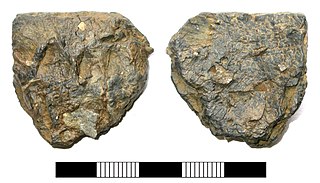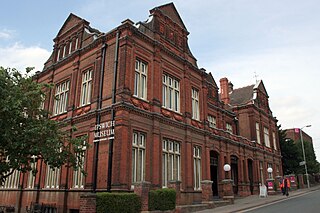Related Research Articles

John Robert Mortimer was an English corn-merchant and archaeologist who lived in Driffield, East Riding of Yorkshire.

Peterborough ware is a decorated pottery style of the early to middle Neolithic. Named after the region of Middlesex and East Anglia, England where the style was first discovered, it is known for the impressed pits made by bone or wood implements in its sides. Whipped cord was also used to make circular 'maggot' patterns. Ebbsfleeet ware, Fengate ware and Mortlake ware have been identified as subdivisions of Peterborough ware.

Sir John Grahame Douglas Clark, who often published as J. G. D. Clark, was a British archaeologist who specialised in the study of Mesolithic Europe and palaeoeconomics. He spent most of his career working at the University of Cambridge, where he was appointed Disney Professor of Archaeology from 1952 to 1974 and Master of Peterhouse from 1973 to 1980.
John Frederick Smerdon Stone was a British archaeologist, most famous for his work in and around Wiltshire, especially at Stonehenge and the Woodhenge area.
The Prehistoric Society is an international learned society devoted to the study of the human past from the earliest times until the emergence of written history.

John James Wymer, was a British archaeologist and one of the leading experts on the Palaeolithic period.

Ipswich Museum is a registered museum of culture, history and natural heritage located on High Street in Ipswich, the county town of Suffolk. It was historically the leading regional museum in Suffolk, housing collections drawn from both the former counties of East Suffolk and West Suffolk, which were amalgamated in 1974.
Courtenay Arthur Ralegh Radford was an English archaeologist and historian who pioneered the exploration of the Dark Ages of Britain and popularised his findings in many official guides and surveys for the Office of Works. His scholarly work appeared in articles in the major British journals, such as Medieval Archaeology or the Proceedings of the British Academy and in the various Transactions of archaeological societies.
Brian "H.B." White was a British cartoonist, creating 'The Nipper' for the Daily Mail between 1933 and 1947. Both "Keyhole Kate" and "Double Trouble" ran in London's Evening Standard.
Shuqba cave is an archaeological site near the town of Shuqba in the western Judaean Mountains in the Ramallah and al-Bireh Governorate of the West Bank.
The Kenyon Institute, previously known as the British School of Archaeology in Jerusalem (BSAJ), is a British overseas research institute supporting humanities and social science studies in Israel and Palestine. It is part of the Council for British Research in the Levant and is sponsored by the British Academy.

Frank Watson Elgee, born 8 November 1880 in North Ormesby (Middlesbrough) Yorkshire, England. He was a published archaeologist, geologist and naturalist who wrote several books on the North York Moors such as The Moorlands of North-Eastern Yorkshire (1912), The Romans in Cleveland (1923) and Early Man in North East Yorkshire (1930). In 1933 Leeds University conferred on him an Honorary degree of Doctor of Philosophy.
Sir Hubert Stanley Houldsworth, 1st Baronet, QC was a barrister, Chairman of the National Coal Board and a British Liberal Party politician.

George Francis Willmot BA FSA (1908–1977) was a British archaeologist and curator based in York
Frank Atkinson was a British museum director and curator. Atkinson is best known for creating the Beamish Museum near Stanley, County Durham, an open-air 'living' museum on the history of the north of England with a focus on the changes brought to both urban and rural life by the industrialisation of the early 20th century.
Cecily Margaret Guido,, also known as Peggy Piggott, was an English archaeologist, prehistorian, and finds specialist. Her career in British archaeology spanned sixty years, and she is recognised for her field methods, her field-leading research into prehistoric settlements, burial traditions, and artefact studies, as well as her high-quality and rapid publication, contributing more than 50 articles and books to her field between the 1930s and 1990s.
Lily Frances "Lal" Chitty, was a British archaeologist and independent scholar, who specialised in the prehistoric archaeology of Wales and the west of England. She has been described as one of the "pioneers in the mapping of archaeological data".
William (Bill) Jones Varley, FSA was a British geographer and archaeologist, particularly known for his excavations of English Iron Age hillforts, including Maiden Castle and Eddisbury hillfort in Cheshire, Old Oswestry hillfort in Shropshire, and Castle Hill in West Yorkshire. He was also a pioneer of geographical research and education in colonial Ghana where he worked in 1947–56, and was involved in historical conservation there.
Thomas Boynton (d.1919) was a British antiquarian from Bridlington.
Margaret Joyce "Joy" Rowe was a British historian. She was a pioneering historian of the study of Catholicism in East Anglia, for which she was awarded a Diocesan Medal by the Diocese of East Anglia on her 90th Birthday in 2016.
References
- ↑ Griffiths, S., Saunders, N.J. (2020),Forged in Conflict: Francis Buckley, the First World War, and British Prehistory. International Journal of Historical Archaeology https://doi.org/10.1007/s10761-020-00572-6 (No volume number or page numbers yet)
- ↑ "Oldham man's place in archaeology". 20 January 2011.
- ↑ https://www.bbc.co.uk/programmes/m000vgvb Griffiths, Seren (BBC) (2021), Battlefield Finds, The Essay, New Generation Thinkers, BBC Radio 3 Broadcast 26th April 2021
- ↑ "Discovery in the Western Front Trenches".
- ↑ "3D Scanning at Gallery Oldham for BBC Civilisations AR App". March 2018.